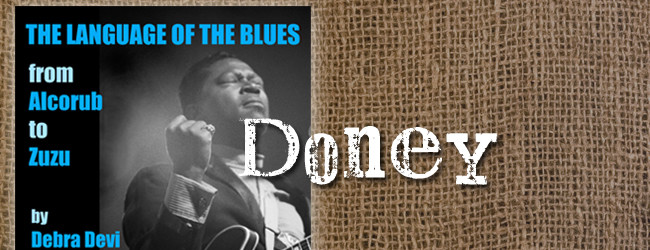This is the latest installment in our weekly series, The Language of the Blues, in which author and rocker Debra Devi explores the meaning of a word or phrase from a blues song. Come back every week for the latest! Devi’s award-winning book, The Language of the Blues: From Alcorub to ZuZu, includes a foreword by Dr. John and is blurbed by Bonnie Raitt and Joe Bonamassa. Get your signed copy at Bluescentric.com!
 The Southern slang term “doney” is rarely heard anymore, but when it is, it’s usually as part of the phrase “no-good doney.”
The Southern slang term “doney” is rarely heard anymore, but when it is, it’s usually as part of the phrase “no-good doney.”
In their insightful 1997 book, The African Heritage of American English, linguists Joseph E. Holloway and Winifred K. Vasshe traced “doney” to the Bantu wordsdonior ndondi, which mean “a burden or load carried by a woman.” A no-good doney is a lazy woman who isn’t willing to stoop to hard work. By extension, she’s probably earning her living on her back.
When William Ferris was in Clarksdale in 1968 recording performances at a house party, he heard this snatch of Robert Johnson’s “I Believe I’ll Dust My Broom” sung by a local musician named Jasper Love:
I don’t want no woman want every downtown man she meets
She’s a no-good doney, they shouldn’t allow her on the street
The Wolof were the first enslaved Africans to reach the American colonies, but by 1730, the slave trade had reached beyond their Senegambia villages into the Central Africa homeland of the Bantu civilization. Large numbers of Bantu people from the Kongo Empire of southwest Africa (now northern Angola, Cabinda, Republic of the Congo, and the western section of the Democractic Republic of the Congo) were sold into slavery and shipped to South Carolina in the mid-to-late 1700s.
These people, known as Bakongo or Kongo, were used mostly as field hands. Since they had much less contact with slave-owners than the Wolof, who had arrived in the New World earlier and tended to therefore be employed primarily as house-servants, the Bakongo were able to retain more of their culture intact. Scholars have documented many survivals of Bantu speech, cooking, music, dance, art, and religion in African-American culture.
One Bantu-speaking tribe, the Kimbundu, called a stringed musical instrument they brought to the Southern colonies the mbanza. In English it became banza, banjar, bangie, and finally “banjo.” We also got “jiffy” from the Bantu word tshipi, which means “short” or “in a second,” and “boo boo” from mbubu, which means “blunder.”
Songs:
“I Believe I’ll Dust My Broom”- Robert Johnson
“Long-Haired Doney”- R.L. Burnside
Video:
R.L. Burnside – “Long-Haired Doney”-

